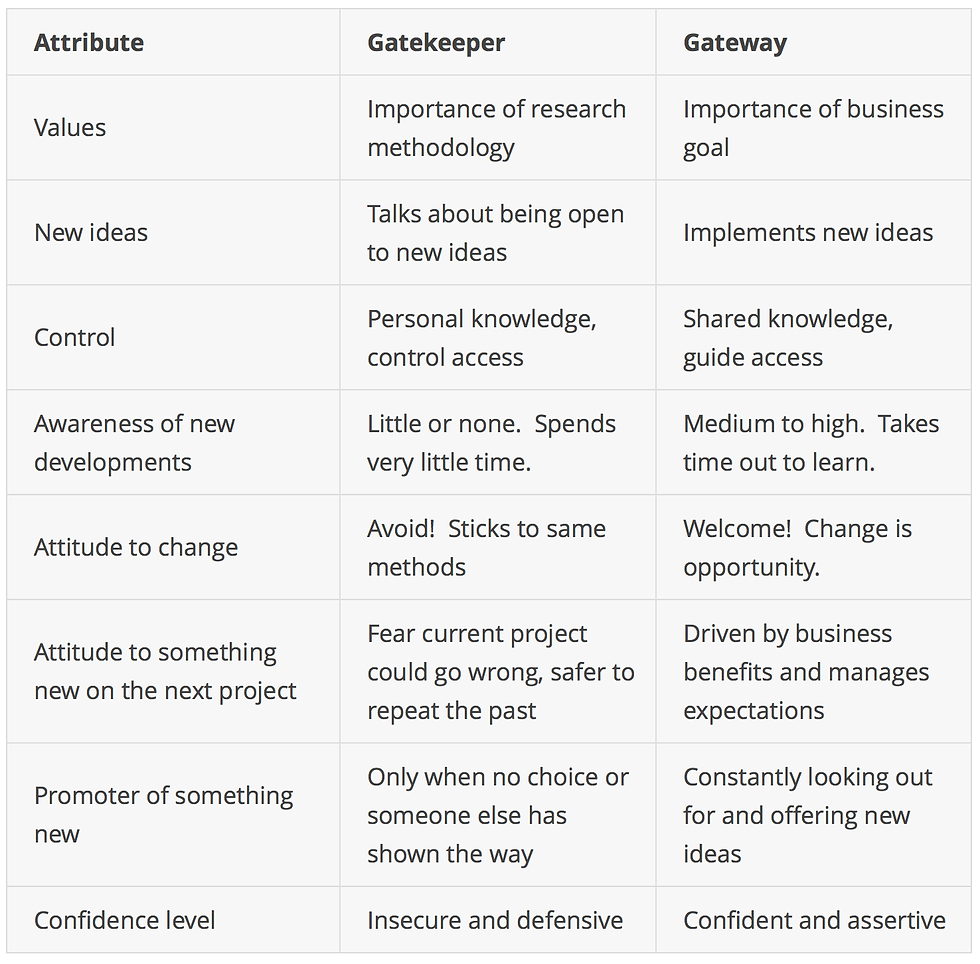Market Research’s choice: Gateway to the future or Gatekeeper of the past
- nuaxia

- Oct 1, 2017
- 4 min read

Wednesday, 15 March 2017
Never in the past twenty years or so that I have been involved in market research has the industry been presented with so many new opportunities to evolve and grow. It is the Golden Age of Research Reinvented.
So why have market researchers missed the boat on leading growth areas like customer experience and big data? So why do most independent prognoses for primary market research involve a significant reduction in the number and size of quantitative research programmes with the consequential loss of jobs for both manufacturers and agencies?
Gateway or Gatekeeper
One of the mantras of a former CEO, Adrian Chedore, was that market researchers needed to be the gateway to market research not gatekeepers. A gateway is of course an open environment that suggests a strong awareness of what is on both sides. A Gatekeeper’s focus is on the door!
Manufacturer vs Agency
An agency is just as capable of being a Gatekeeper as someone in a manufacturer. As a leading CEO put it to me at IIeX: “An agency has a duty to constantly offer their client new ideas”.
Which one are you?
No one admits to being a Gatekeeper but as an industry, almost everyone is one. I have done a little table looking at some of the key indicators of each. Be truthful, if you are in market research, your actions class you almost certainly a Gatekeeper!

Opportunity is still knocking
I am sure that there are a large number of cleverer people than me who would design a better table. All I want to achieve is to get market research out of denial and into acceptance of how the industry is behaving. Why? Because there are still a huge number of opportunities to benefit from IF the industry can grasp change rather than avoid it. Here are some examples of opportunities that are available now and which gateway organisations are already using:
(1) DIY and Automation:
“Give a person a fish, and you feed the person for a day. Teach a person to fish, and you feed the person for a lifetime”
There are still significant unmet business needs for market research. There is a stream of DIY and automated solutions now available that are fast, cheap and easy to use. Not all market research questions need to be conducted by market research departments and not all questions need market research consultants/agencies.
Being a gateway does not erode control and influence, it enhances it. The Gateway approach moves from doing to empowering. It will result in more decisions being impacted by market research, not less. The role of a market researcher doesn’t disappear, it changes. Someone still needs to review what is best in class and implement it; someone is still needed as a subject matter expert and consultant. What you lose is the obligations of project management and administration– and if that is all that you can do, you really need to re-train urgently.
(2) Shared knowledge platforms:
“Knowledge is Power; Shared Knowledge is Power Multiplied”
Think of the market researcher of the future as head librarian. Empower people to know what is already known. Unilever implemented a knowledge sharing platform and it paid for itself just in the amount of research that they no longer had to repeat.
(3) Visualisation and storytelling:
“Storytelling is the most powerful way to put ideas into the world.”
Market research has consistently failed to influence decision-making. This is not because the research was necessarily bad. It is about the way it is presented. Powerpoint decks do not resonate with business users. They are fine if someone wants to dig into the detail but they fail to drive any emotional engagement – engagement that is needed in order to make decisions.
Think instead about video summaries – the voice of your customer telling a story. It is not expensive – there are DIY solutions that can provide authentic, “in the moment” clips. Infographics are a much better form of visual summary than an executive summary in Powerpoint.
(4) Beyond direct questions:
“Insanity: doing the same thing over and over again and expecting different results.”
The gap between what people say they do and what they actually do is well documented. Technologies and techniques that drive towards understanding system 1 thinking like eye tracking, facial analysis and sentiment analysis present huge opportunities to properly understand what customers are really thinking. AI is not there yet, but it will also become a powerful tool in the future where the situation is appropriate.
(5) New technologies, new opportunities:
“Creativity is contagious, pass it on”
Mobile research and online communities all give new opportunities to get insight that we previously could not. These do not have to be seen as a “replacement” to traditional research, although they may be. These present many more “and” opportunities. So, combining big data with traditional qualitative interviews or short video qualitative interviews to understand why or short quantitative surveys to calibrate or verify data.
Carve out “Gold time”
Exciting changes are here. Right now. If you want to be part of the new MR world, then you need to learn about it, embrace it and implement it. It is important for you and important for your organizations. So, put some aside in your diary. Every week, carve out two hours for your “gold time” (important but not urgent work). Never cancel it and ignore your email during that time. If you think you are too busy, you are just getting distracted by urgent and unimportant or unimportant and non-urgent tasks. And that is just being incompetent…sorry, but I am just saying it as it is.
Gateway to the future or Gatekeeper of the past?
The good news is that you have a choice. It should be a no-brainer so why is 90%+ of the industry “Researchersaurs”? Just remember, it didn’t end well for the dinosaurs. And you don’t have 165 million years to make up your mind…



Comments